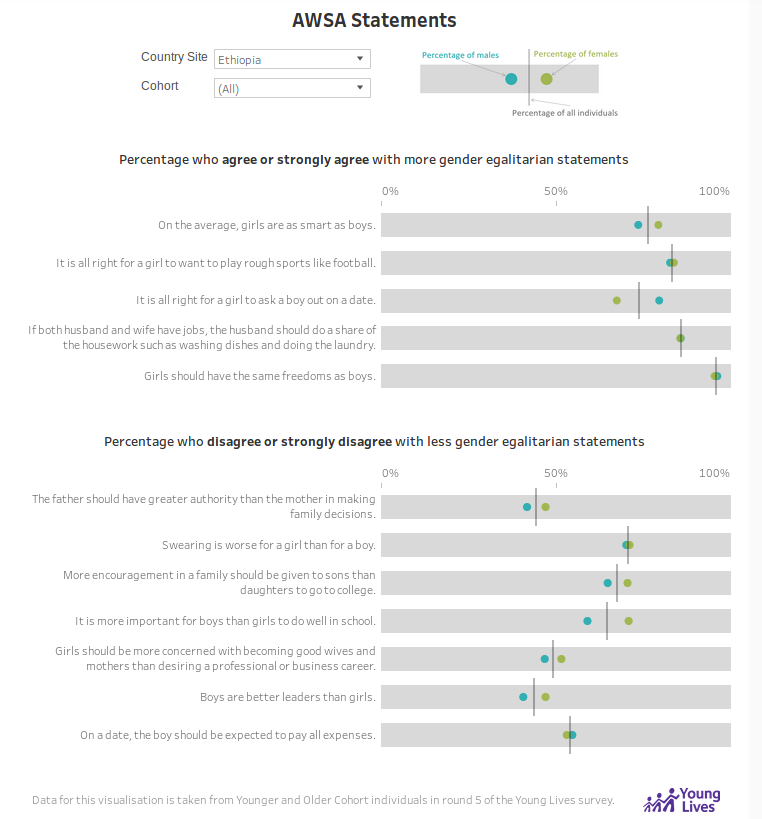Explore our assessment of attitudes towards women through average AWSA scores of Younger and Older Cohort individuals during the Round 5 survey (in 2016) by sex and country site:

The AWSA score is a score ranging between 0 to 1 (see here for more information on how the score has been computed), with higher score corresponding to more gender egalitarian view.
Also explore the degree and nature of Younger and Older Cohort concurrence with AWSA statements (during the Round 5 survey in 2016) based on data capturing percentage of individuals who ‘agree‘ or ‘strongly agree’ with more gender egalitarian statements and percentage who ‘disagree’ or ‘strongly disagree’ with less gender egalitarian statements by sex and country site:

For more information on how we define our scales, please see our data dictionary below.
| Label | Description |
| Location | Household's location in round 5 (2016) survey. The sentinel sites and communities that households were sampled from in 2016 were defined as urban or rural, based on administrative definitions in each country. |
| Household wealth | Household's wealth in round 5 (2016) survey computed using the Young Lives Wealth Index disaggregated into terciles (top, middle, bottom). The Young Lives Wealth Index is a composite index measuring households' access to services such as water and sanitation, their ownership of consumer durables such as refrigerators, and the quality of floor, roof, and wall materials in their dwelling. Households in each cohort of the Young Lives survey were categorised into terciles based on their wealth index in 2002, with the households with lowest wealth belonging to the bottom tercile, and those with the highest wealth belonging to the top tercile. |
| Activity |
Studying: Average hours spent at school/college/university (including all time spent, not only attending hours, and travelling time, out and return), studying at home, and extra tuition outside the home. Working (paid): Average hours spent doing activities for pay or for money outside of household or for someone not in the household. Working (unpaid): Average hours spent doing tasks on family farm, cattle herding (household and/or community), other family business, shepherding, piecework or handicrafts done at home (not just farming). Doing domestic tasks (including caring for others): Average hours spent doing domestic tasks (fetching water, firewood, cleaning, cooking, washing, and shopping) and caring for others (younger children or ill households members). Playing: Average hours spent on leisure (playing, seeing frineds, using the internet, etc.) Sleeping: Average hours spent sleeping. |
Explore our assessment of attitudes towards women through average AWSA scores of Younger and Older Cohort individuals during the Round 5 survey (in 2016) by sex and country site:

The AWSA score is a score ranging between 0 to 1 (see here for more information on how the score has been computed), with higher score corresponding to more gender egalitarian view.
Also explore the degree and nature of Younger and Older Cohort concurrence with AWSA statements (during the Round 5 survey in 2016) based on data capturing percentage of individuals who ‘agree‘ or ‘strongly agree’ with more gender egalitarian statements and percentage who ‘disagree’ or ‘strongly disagree’ with less gender egalitarian statements by sex and country site:

For more information on how we define our scales, please see our data dictionary below.
| Label | Description |
| Location | Household's location in round 5 (2016) survey. The sentinel sites and communities that households were sampled from in 2016 were defined as urban or rural, based on administrative definitions in each country. |
| Household wealth | Household's wealth in round 5 (2016) survey computed using the Young Lives Wealth Index disaggregated into terciles (top, middle, bottom). The Young Lives Wealth Index is a composite index measuring households' access to services such as water and sanitation, their ownership of consumer durables such as refrigerators, and the quality of floor, roof, and wall materials in their dwelling. Households in each cohort of the Young Lives survey were categorised into terciles based on their wealth index in 2002, with the households with lowest wealth belonging to the bottom tercile, and those with the highest wealth belonging to the top tercile. |
| Activity |
Studying: Average hours spent at school/college/university (including all time spent, not only attending hours, and travelling time, out and return), studying at home, and extra tuition outside the home. Working (paid): Average hours spent doing activities for pay or for money outside of household or for someone not in the household. Working (unpaid): Average hours spent doing tasks on family farm, cattle herding (household and/or community), other family business, shepherding, piecework or handicrafts done at home (not just farming). Doing domestic tasks (including caring for others): Average hours spent doing domestic tasks (fetching water, firewood, cleaning, cooking, washing, and shopping) and caring for others (younger children or ill households members). Playing: Average hours spent on leisure (playing, seeing frineds, using the internet, etc.) Sleeping: Average hours spent sleeping. |

